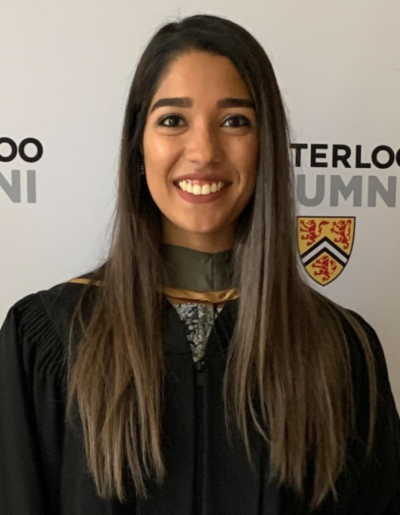
Did you know that approximately four in five healthcare workers around the world are women? We are shining a light on the work of women healthcare workers in Canada.
Afomia Gebre is a 2020 Dalhousie College of Pharmacy graduate. She is currently completing a residency through the Nova Scotia Health Authority (NSHA). Outside of Pharmacy, Afomia works with and advocates for members of equity seeking groups. Afomia helped start the first Diversity and Equity committee at the College of Pharmacy and travelled to Ghana as a delegate for the African Youth and Governance Convergence (AYGC) at which she was the chair for the Health committee. She also works as a mentor and tutor for youth through various organizations.
After immigrating to Canada at the age of five and helping her parents navigate the healthcare system, Afomia quickly realized the gaps in healthcare delivery and the importance of cultural humility in practice. Her main career goal is to be part of the solution that helps to close the health equity gap present in our healthcare system.
How has the pandemic impacted your work? If you could get Canadians to understand one thing about your work during the pandemic, what would it be?
This pandemic has added a layer of anxiety and stress that I have never felt before. I am currently a resident at the Nova Scotia Health Authority. This pharmacy program in itself is one that is demanding and this pandemic has added another layer of complexity. The work environment has shifted to one where you constantly have to be aware of how you interact with your patients and with your colleagues. However, it has also created an environment where you feel more purposeful, where there is opportunity to step up and be a member of hardworking interdisciplinary teams that deliver care for patients during difficult times. COVID-19 has also created an environment where you understand your patients on a more personal level because although it may look different for all of us, we have all in some shape or form been negatively impacted by this virus so it is easier to empathize and relate to one another.
If there was one thing that I wish Canadians would understand about my work as both a pharmacy resident and a pharmacist is the fact that pharmacists are pillars in healthcare delivery, not gatekeepers for medication. I wish more people understood how versatile, accessible and hardworking we are, particularly how accessible we have been throughout this pandemic to bridge the gaps that COVID-19 created.
How has the pandemic impacted your personal life?
Since the start of this pandemic, my life has felt more structured but not in a good way. I do not have the freedom to make last minute plans and I can’t move through my days with the same ‘go with the flow’ attitude as I used to. Everything requires planning and appointments. This has brought a sense of anxiety because every week I feel like I need to plan ahead for the week coming. There has also been some economic impacts, especially as a new grad who is doing a residency, that I never imagined experiencing. Throughout all of that, this pandemic has changed my perspective to one where I view my situations with more gratitude. It has also allowed me more time with my family because we are all home more often than before. More than anything, it has reminded me to slow down and appreciate where I am in life and who I am around because this pandemic has shown all of us how quickly your situation can change.
Have you been vaccinated? If so, how did you feel when you found out that you were scheduled to get the vaccine? If not, how has the wait impacted your mental health?
I have been vaccinated. When I found out that I was going to receive the vaccine, I felt a sense of relief. Not only because I am now more protected from this virus but because for me this was the light at the end of the tunnel. It felt like we have been running a race that seemed like it was never going to end but suddenly, on the horizon, we can see the finish line.
What is one piece of advice that you would give to students during this time?
I remember being a student and trying to juggle school, a job and extracurriculars. Oftentimes, I would put all of these things before myself and would only realize that I was not okay once I was completely burnt out. I did not take care of my mental health because excelling at all of the things I was doing was more important to me and this eventually caught up to me. Now, students are doing all of these things but in the middle of a pandemic, which adds a whole other layer of stressors. My advice would be to take care of your mental health. Be selfish with your time, do not take on too much and, most importantly, do things that you enjoy. Take care of yourself so you can truly be present to reap the benefits of your hard work.
It has been a long and hard year. What keeps you going? Are there any hopefully stories that you can share with us?
What keeps me going is remembering my purpose and the reason I became a pharmacist. I have moved through this healthcare system as both a Black patient and a Black pharmacist. Through both of my experiences, I have been exposed to racism and discrimination. We exist in a healthcare system where we do not see a person before a patient. Although the importance of the social determinants of health is recognized, I think there is work that needs to be done to promote inclusivity within pharmacy practice and healthcare at large. What keeps me motivated is knowing that I have a role in moving pharmacy practice in a direction that delivers holistic care. One where cultural humility is mandatory, not recommended. One where the color of your skin, religious beliefs, gender identity, economic status or physical abilities do not dictate the quality of care you receive. That is what keeps me going—remembering why I entered the healthcare field and knowing that there is a lot of important work that needs to be done to shape our healthcare system into one that promotes health equity.
The Equal Futures Network acknowledges that Indigenous people are the traditional guardians of Turtle Island, on the land also known as Canada






